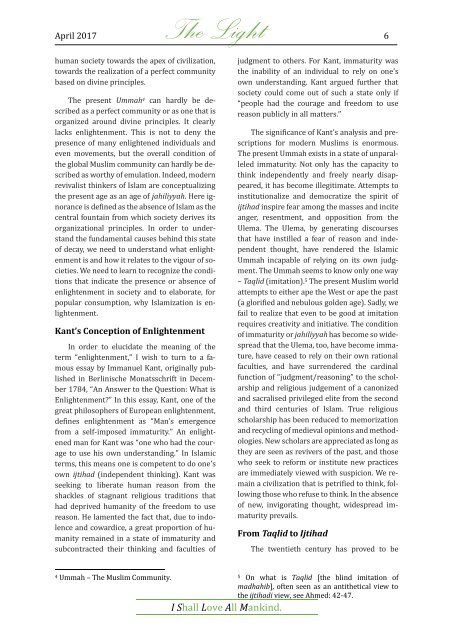2017 04 The Light April 2017
monthly Journal of the Ahmadiyya Association for the Propagation of Islam. Presenting Islam as a tolerant, liberal and peaceful religion as practiced by the Holy Prophet Muhammad (s).
monthly Journal of the Ahmadiyya Association for the Propagation of Islam. Presenting Islam as a tolerant, liberal and peaceful religion as practiced by the Holy Prophet Muhammad (s).
You also want an ePaper? Increase the reach of your titles
YUMPU automatically turns print PDFs into web optimized ePapers that Google loves.
<strong>April</strong> <strong>2017</strong> <strong>The</strong><br />
<strong>Light</strong> 6<br />
human society towards the apex of civilization,<br />
towards the realization of a perfect community<br />
based on divine principles.<br />
<strong>The</strong> present Ummah 4 can hardly be described<br />
as a perfect community or as one that is<br />
organized around divine principles. It clearly<br />
lacks enlightenment. This is not to deny the<br />
presence of many enlightened individuals and<br />
even movements, but the overall condition of<br />
the global Muslim community can hardly be described<br />
as worthy of emulation. Indeed, modern<br />
revivalist thinkers of Islam are conceptualizing<br />
the present age as an age of jahiliyyah. Here ignorance<br />
is defined as the absence of Islam as the<br />
central fountain from which society derives its<br />
organizational principles. In order to understand<br />
the fundamental causes behind this state<br />
of decay, we need to understand what enlightenment<br />
is and how it relates to the vigour of societies.<br />
We need to learn to recognize the conditions<br />
that indicate the presence or absence of<br />
enlightenment in society and to elaborate, for<br />
popular consumption, why Islamization is enlightenment.<br />
Kant’s Conception of Enlightenment<br />
In order to elucidate the meaning of the<br />
term “enlightenment,” I wish to turn to a famous<br />
essay by Immanuel Kant, originally published<br />
in Berlinische Monatsschrift in December<br />
1784, “An Answer to the Question: What is<br />
Enlightenment?” In this essay, Kant, one of the<br />
great philosophers of European enlightenment,<br />
defines enlightenment as “Man’s emergence<br />
from a self-imposed immaturity.” An enlightened<br />
man for Kant was “one who had the courage<br />
to use his own understanding.” In Islamic<br />
terms, this means one is competent to do one’s<br />
own ijtihad (independent thinking). Kant was<br />
seeking to liberate human reason from the<br />
shackles of stagnant religious traditions that<br />
had deprived humanity of the freedom to use<br />
reason. He lamented the fact that, due to indolence<br />
and cowardice, a great proportion of humanity<br />
remained in a state of immaturity and<br />
subcontracted their thinking and faculties of<br />
judgment to others. For Kant, immaturity was<br />
the inability of an individual to rely on one’s<br />
own understanding. Kant argued further that<br />
society could come out of such a state only if<br />
“people had the courage and freedom to use<br />
reason publicly in all matters.”<br />
<strong>The</strong> significance of Kant’s analysis and prescriptions<br />
for modern Muslims is enormous.<br />
<strong>The</strong> present Ummah exists in a state of unparalleled<br />
immaturity. Not only has the capacity to<br />
think independently and freely nearly disappeared,<br />
it has become illegitimate. Attempts to<br />
institutionalize and democratize the spirit of<br />
ijtihad inspire fear among the masses and incite<br />
anger, resentment, and opposition from the<br />
Ulema. <strong>The</strong> Ulema, by generating discourses<br />
that have instilled a fear of reason and independent<br />
thought, have rendered the Islamic<br />
Ummah incapable of relying on its own judgment.<br />
<strong>The</strong> Ummah seems to know only one way<br />
– Taqlid (imitation). 5 <strong>The</strong> present Muslim world<br />
attempts to either ape the West or ape the past<br />
(a glorified and nebulous golden age). Sadly, we<br />
fail to realize that even to be good at imitation<br />
requires creativity and initiative. <strong>The</strong> condition<br />
of immaturity or jahiliyyah has become so widespread<br />
that the Ulema, too, have become immature,<br />
have ceased to rely on their own rational<br />
faculties, and have surrendered the cardinal<br />
function of “judgment/reasoning” to the scholarship<br />
and religious judgement of a canonized<br />
and sacralised privileged elite from the second<br />
and third centuries of Islam. True religious<br />
scholarship has been reduced to memorization<br />
and recycling of medieval opinions and methodologies.<br />
New scholars are appreciated as long as<br />
they are seen as revivers of the past, and those<br />
who seek to reform or institute new practices<br />
are immediately viewed with suspicion. We remain<br />
a civilization that is petrified to think, following<br />
those who refuse to think. In the absence<br />
of new, invigorating thought, widespread immaturity<br />
prevails.<br />
From Taqlid to Ijtihad<br />
<strong>The</strong> twentieth century has proved to be<br />
4 Ummah – <strong>The</strong> Muslim Community.<br />
I Shall Love All Mankind.<br />
5 On what is Taqlid [the blind imitation of<br />
madhahib], often seen as an antithetical view to<br />
the ijtihadi view, see Ahmed: 42-47.














